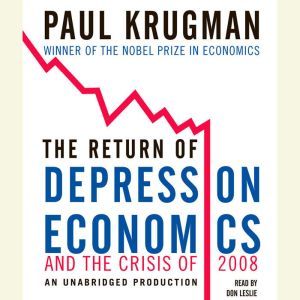

The Return of Depression Economics and the Crisis of 2008
Author: Paul Krugman
Narrator: Don Leslie
Unabridged: 6 hr 33 min
Format: Digital Audiobook Download
Publisher: Random House Audio
Published: 12/02/2008
Categories: Nonfiction, Business & Economics, History, Modern History
Synopsis
In this new, greatly updated edition of The Return of Depression Economics, Paul shows how the failure of regulation to keep pace with an increasingly out-of-control financial system set the United States, and the world as a whole, up for the greatest financial crisis since the 1930s. He also lays out the steps that must be taken to contain the crisis, and turn around a world economy sliding into a deep recession. Brilliantly crafted in Paul's trademark style - lucid, lively and supremely informed - this new edition of The Return of Depression Economics will become an instant cornerstone of the debate over how to respond to the crisis.
